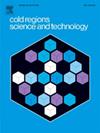A new method to estimate the soil freezing characteristic curve
IF 3.8
2区 工程技术
Q1 ENGINEERING, CIVIL
引用次数: 0
Abstract
The soil freezing characteristic curve (SFCC) defines the relationship between unfrozen water content and temperature. It is an important soil parameter in cold regions, but it is not easy to obtain, especially in the field. This paper proposes a method to indirectly estimate the SFCC for both fine-grained and coarse-grained soils by using the one-measurement SFCC method. From regression analysis, the parameters of the van Genuchten SFCC model can be expressed as functions of an adjustable parameter x. The SFCC of a soil sample contained three different zones, and sensitivity analysis indicated that the measured point in Zone 2 provided the most reliable SFCC estimation results. The proposed model and four widely acknowledged models were compared and evaluated with 33 fine-grained soils and 9 coarse-grained soils. The results showed that the proposed model provided the best estimation of the SFCC among the five models. This result also indicated that the proposed model provided a better estimation of the SFCC for fine-grained soils. This study provides a reliable approach to develop an SFCC estimation model with the one-measurement SFCC method.
估算土壤冻结特性曲线的新方法
土壤冻结特征曲线(SFCC)定义了未冻结含水量与温度之间的关系。它是寒冷地区的一个重要土壤参数,但不易获得,尤其是在野外。本文提出了一种利用一次测量 SFCC 法间接估算细粒土和粗粒土 SFCC 的方法。通过回归分析,van Genuchten SFCC 模型的参数可表示为可调参数 x 的函数。土壤样本的 SFCC 包含三个不同区域,灵敏度分析表明,区域 2 中的测量点可提供最可靠的 SFCC 估算结果。利用 33 种细粒度土壤和 9 种粗粒度土壤,对提出的模型和四种广为认可的模型进行了比较和评估。结果表明,在五个模型中,建议的模型提供了最佳的 SFCC 估算结果。这一结果还表明,拟议模型对细粒土的 SFCC 估算效果更好。这项研究为利用一次测量 SFCC 方法建立 SFCC 估算模型提供了一种可靠的方法。
本文章由计算机程序翻译,如有差异,请以英文原文为准。
求助全文
约1分钟内获得全文
求助全文
来源期刊

Cold Regions Science and Technology
工程技术-地球科学综合
CiteScore
7.40
自引率
12.20%
发文量
209
审稿时长
4.9 months
期刊介绍:
Cold Regions Science and Technology is an international journal dealing with the science and technical problems of cold environments in both the polar regions and more temperate locations. It includes fundamental aspects of cryospheric sciences which have applications for cold regions problems as well as engineering topics which relate to the cryosphere.
Emphasis is given to applied science with broad coverage of the physical and mechanical aspects of ice (including glaciers and sea ice), snow and snow avalanches, ice-water systems, ice-bonded soils and permafrost.
Relevant aspects of Earth science, materials science, offshore and river ice engineering are also of primary interest. These include icing of ships and structures as well as trafficability in cold environments. Technological advances for cold regions in research, development, and engineering practice are relevant to the journal. Theoretical papers must include a detailed discussion of the potential application of the theory to address cold regions problems. The journal serves a wide range of specialists, providing a medium for interdisciplinary communication and a convenient source of reference.
 求助内容:
求助内容: 应助结果提醒方式:
应助结果提醒方式:


